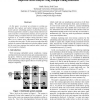Free Online Productivity Tools
i2Speak
i2Symbol
i2OCR
iTex2Img
iWeb2Print
iWeb2Shot
i2Type
iPdf2Split
iPdf2Merge
i2Bopomofo
i2Arabic
i2Style
i2Image
i2PDF
iLatex2Rtf
Sci2ools
DATE
2006
IEEE
2006
IEEE
Improved offset-analysis using multiple timing-references
In this paper, we present an extension to existing approaches that capture and exploit timing-correlation between tasks for scheduling analysis in distributed systems. Previous approaches consider a unique timing-reference for each set of time-correlated tasks and thus, do not capture the complete timing-correlation between task activations. Our approach is to consider multiple timing-references which allows us to capture more information about the timingcorrelation between tasks. We also present an algorithm that exploits the captured information to calculate tighter bounds for the worst-case response time analysis under a static priority preemptive scheduler.
DATE 2006 | Hardware | Priority Preemptive Scheduler | Time-correlated Tasks | Worst-case Response Time |
| Added | 10 Jun 2010 |
| Updated | 10 Jun 2010 |
| Type | Conference |
| Year | 2006 |
| Where | DATE |
| Authors | Rafik Henia, Rolf Ernst |
Comments (0)

